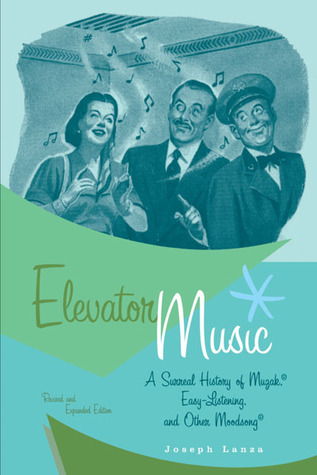The products of mass culture are not automatically to be sneered at, first because of their massive presence and second because sometimes they have a certain merit or are somehow amusing. The Creature From the Black Lagoon movies are still symbolically potent, and McDonald’s has been known to dispense the best coffee that is easily available. But the movie house (or the video store) and the burger joint are environments we can choose or not choose. Some of the most insidious attacks by mass culture are invasions that we can hardly escape altogether. The grunge rockers, after all, aren’t responsible for the vile background music we try to ignore in overpriced restaurants. That stuff is the work of the “grownies,” as I have heard them called.
Even in the dentist’s chair, the pain caused by “background music” blots out any other. The sense of aesthetic, moral, and even political outrage is more powerful than routine unpleasantness. Though bad music is by definition boring, that by no means implies that it is without significance, for the denial of meaning is itself meaningful. Nonbeing is the essential contemporary assertion. And in a queasy elevator in one of Mr. John Portman’s Babylonian atria, the smarmy totalitarianism implied by musical manipulativeness is so obnoxious that it overcomes any proprioceptive anxieties or creeping acrophobia. Who wants to . . . relax . . . in defiance of the law of gravity, anyway? Americans have embraced bad music just as they have endorsed bad service, bad manners, bad food, bad architecture, bad art—bad everything. Joseph Lanza’s survey of the phenomenon of putrid music as an instrument of social control rests uneasily, it seems to me, upon his failure to confront a contradiction that is not so much his personal fault as it is our national shortcoming.
Lanza’s book will not be the last word on the topic, but it is a useful treatment of one of the most disquieting of social phenomena. The word “Muzak” is a portmanteau of “music” and “Kodak,” coined by General George Owen Squier, who pioneered modern communications for the Army and AT&T. The multiplex cable would wire the world and complete the industrialization of music, as envisioned by Bellamy, Zamyatin, Huxley, and Orwell in their passed-over but not passe visions of the future—our past and present. Lee de Forest, David Sarnoff, and the rest played a part in the mass culture of today, in which control is disguised as entertainment and even freedom, (“Stimulus Progression” is the name of Muzak’s most elaborate program, which runs counter to the average worker’s “fatigue curve.”) Lanza sees objections to the obtrusiveness of Muzak as a “pesky bugaboo . . . the notion that piped-in music somehow interferes with an individual’s right to privacy and even brainwashes listeners.” But if it does not “interfere” and “brainwash,” then why do managers pay for the service? Because they like the Ray Coniff Singers?
I think that Lanza is trying to establish a postmodern view of bad music, something like what Robert Venturi did with the cheerfully sleazy architecture of Las Vegas. We must admit that the phenomenon he glosses is pervasive and historically rooted. Certainly he has made a contribution to the study of industrialized, mass-produced dreadfulness, treating as he does Annunzio Paolo Mantovani, the 101 Strings, the Mystic Moods Orchestra, Les Baxter, Martin Denny, the Honolulu Fruit Gum Orchestra (which became Lawrence Welk and his Champagne Music Makers), and many another. But though he himself supplies illustrations of the control that Muzak sells, even to brothels and abattoirs, Lanza himself endorses the feelgood world created by “easy listening”:
elevator music (besides just being good music) is essentially a distillation of the happiness that modern technology has promised. A world without elevator music would be much grimmer than its detractors (and those who take it for granted) could ever realize. This is because most of us, in our hearts, want a world tailored by Walt Disney “imagineers,” an ergonomical “Main Street U.S.A.,” where the buildings never make you feel too small, where the act of paying admission is tantamount to a screen-test—and where the music never stops.
Lanza has the numbers on his side. Consumerism and vulgarity have created a massive philistinism, one unanticipated by Matthew Arnold, even though that worthy knew what “doing as one likes” implies. To comprehend the immensity of the sickness, radical irony, shock tactics, and elitist standards are required: Adorno’s essays, Nabokov’s Lolita, Pynchon’s Gravity’s Rainbow—and George Romero’s Dawn of the Dead, which cauterizes vulgarity with emetic ghoulishness: flesh-eating zombies staggering to mall music.
Just as vital creatures have no need of “stimulation,” those clear of mind and conscience don’t need music for anesthesia but for higher and more demanding reasons. The quicksand of Muzak absorbed rock ‘n’ roll without so much as a belch, just as it did “the classics,” proving its own power of gelatinous mindlessness. Joseph Lanza’s study is advocacy instead of criticism, confusing bad taste with good and, what’s worse, soft totalitarianism with the good life. But it has its own documentary value and will provide a basis for the transvaluation that is desperately needed.
[Elevator Music: A Surreal History of Muzak, Easy-Listening, and Other Moodsong, by Joseph Lanza (New York: St. Martin’s Press) 272 pp., $22.00]



Leave a Reply